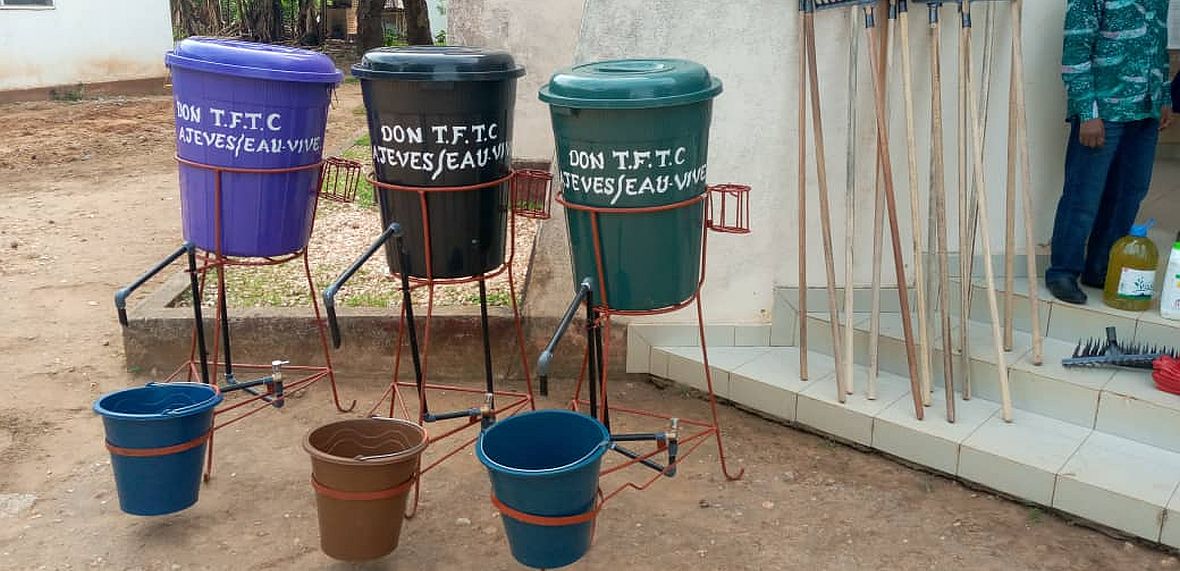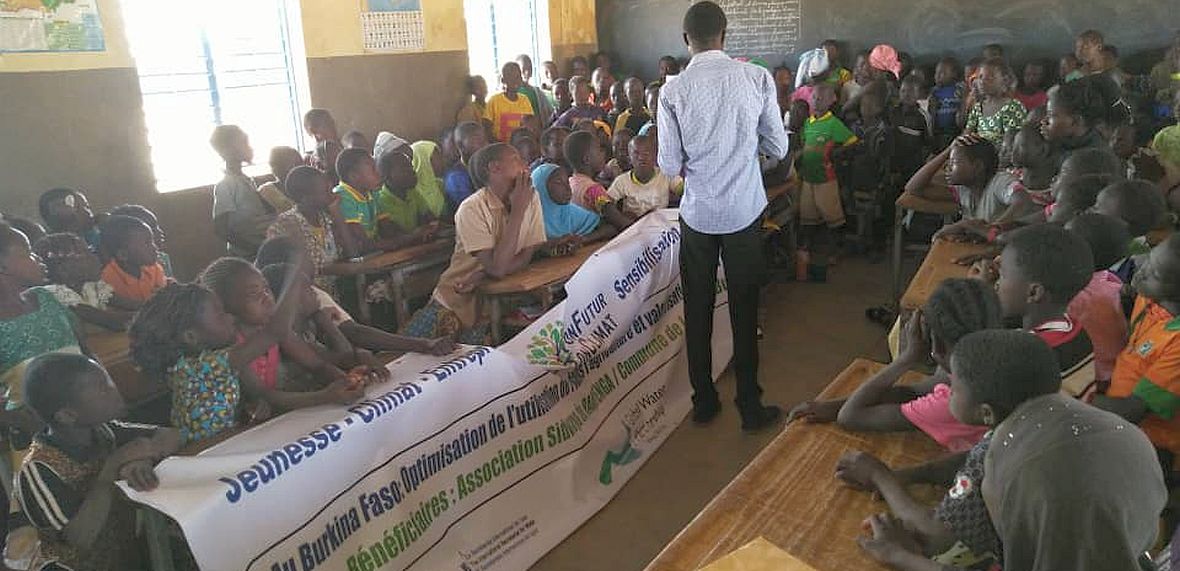In Togo, the project has identified the need to improve the conditions for livestock farming, protect the market gardening site from erosion, preserve the village river from drying up and equip the market garden producers. The project has also helped improve the working conditions and income of 35 young people in Danyi-Apéyémé-Todomé, to sustainably protect the local water resources, environment and soils, and to mobilize youth for environmental protection and IWRM.
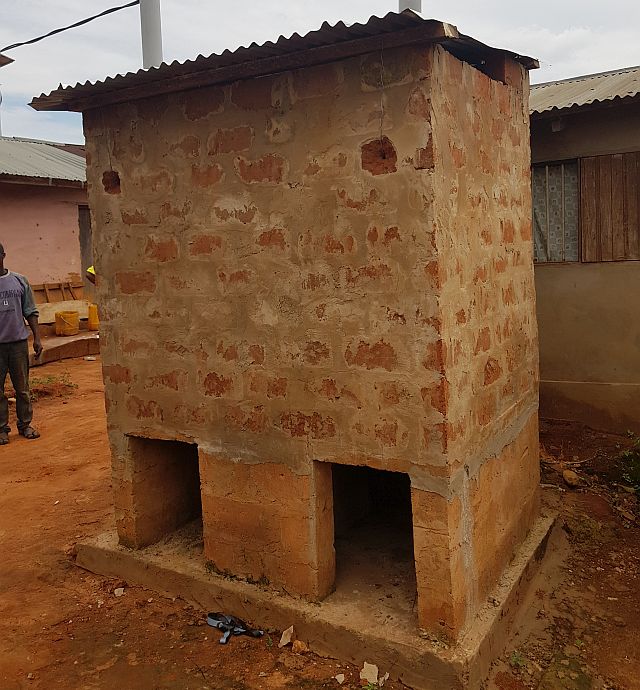 The project was implemented by Eau Vive Togo in cooperation with the Association des Jeunes Volontaires pour l'Education et la Santé (AJEVES), a youth association operating for several years in the locality with the collaboration of the Danyi1 Town Hall, the state's decentralized technical services, the local grassroots development committees, the traditional chieftaincy, youth associations and women's associations.
The project was implemented by Eau Vive Togo in cooperation with the Association des Jeunes Volontaires pour l'Education et la Santé (AJEVES), a youth association operating for several years in the locality with the collaboration of the Danyi1 Town Hall, the state's decentralized technical services, the local grassroots development committees, the traditional chieftaincy, youth associations and women's associations.
In Benin, the pilot action focused on the "Support for the restoration of ecosystems at the head of the Mekrou river basin and environmental education" as a local level IWRM initiative of CWP-Benin. The project contributed to the restoration of the ecosystems of the head of the Mekrou river basin in the municipality of Kouandé, which is in a very advanced state of degradation, through the mobilization of the youth and environmental education. The project has helped reduce the pressure exerted by women on trees by training them in the construction and use of energy-efficient wood-burning stoves; strengthening the capacities of young schoolchildren and college students to encourage them to behave for environmental conservation in a context of climate change; raising community awareness to protect the environment; promoting alternative and non-destructive environmental activities and restoring the degraded ecosystem through reforestation.
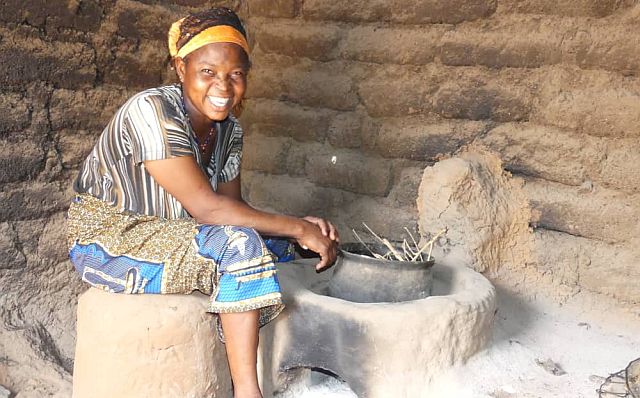 To achieve these results, three youth associations including REJEVE (Youth Network for the Green Economy), JCI (Junior Chamber International) and the Birni Youth Consultative Body (OCJ-Birni) supported the implementation of the project respectively on the components: Improved Homes - Environmental Education and Reforestation.
To achieve these results, three youth associations including REJEVE (Youth Network for the Green Economy), JCI (Junior Chamber International) and the Birni Youth Consultative Body (OCJ-Birni) supported the implementation of the project respectively on the components: Improved Homes - Environmental Education and Reforestation.
In Burkina, the pilot action intitled Optimization of water use in agriculture and valorization of renewable energies for the benefit of a youth association in Burkina Faso was implemented to increase the resilience of rural youth to climate change through the use of water- and energy-saving technologies for agricultural production and the improvement of their employability while making them actors of development in their community.
The project has enabled the development of 1.5 ha of drip irrigated perimeter supplied with solar energy from a large diameter well and a supplementary borehole with a flow rate of 3m3/hour. In addition, it has strengthened the capacities of the 16 beneficiaries and the 7 local market gardeners in terms of community life, the proper keeping of administrative and financial documents, and the use and management of phytosanitary products and their derivatives.
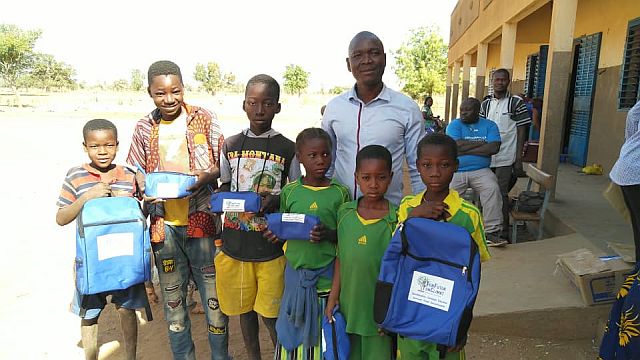 In addition, 10 members of the association have become trainers in the management and maintenance of equipment in the area. Then, the project enabled 52 beneficiaries of the association Jeune La Touma in Saponé and 16 beneficiaries of the association Sidwaya in Ramitenga to learn good production techniques through the production and use of compost and natural pesticides. In fact, the establishment of the Farmers Field School has enabled to increase the production of market gardening products. Finally, this project enabled the sensitization of 50 women from the village of Koakin on hygiene and improvement of the living environment as well as the sensitization of 600 students from three schools near Ramitenga on the importance of the fight against abusive wood cutting, animal raving and bush fires and good hygiene practices by providing them with school kits (notebooks, kits and bags) and contributed to fighting Covid-19 by equipping the schools with hand-washing facilities.
In addition, 10 members of the association have become trainers in the management and maintenance of equipment in the area. Then, the project enabled 52 beneficiaries of the association Jeune La Touma in Saponé and 16 beneficiaries of the association Sidwaya in Ramitenga to learn good production techniques through the production and use of compost and natural pesticides. In fact, the establishment of the Farmers Field School has enabled to increase the production of market gardening products. Finally, this project enabled the sensitization of 50 women from the village of Koakin on hygiene and improvement of the living environment as well as the sensitization of 600 students from three schools near Ramitenga on the importance of the fight against abusive wood cutting, animal raving and bush fires and good hygiene practices by providing them with school kits (notebooks, kits and bags) and contributed to fighting Covid-19 by equipping the schools with hand-washing facilities.
